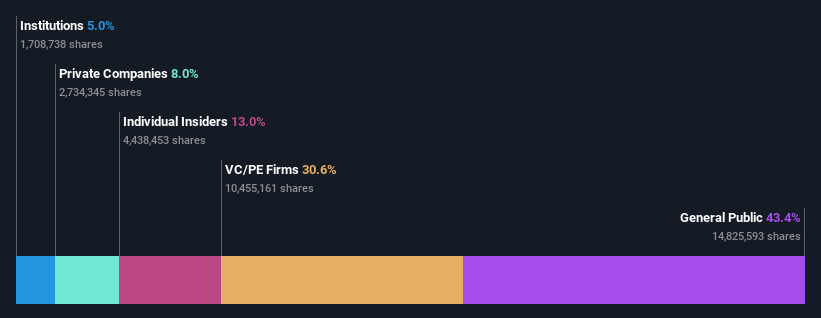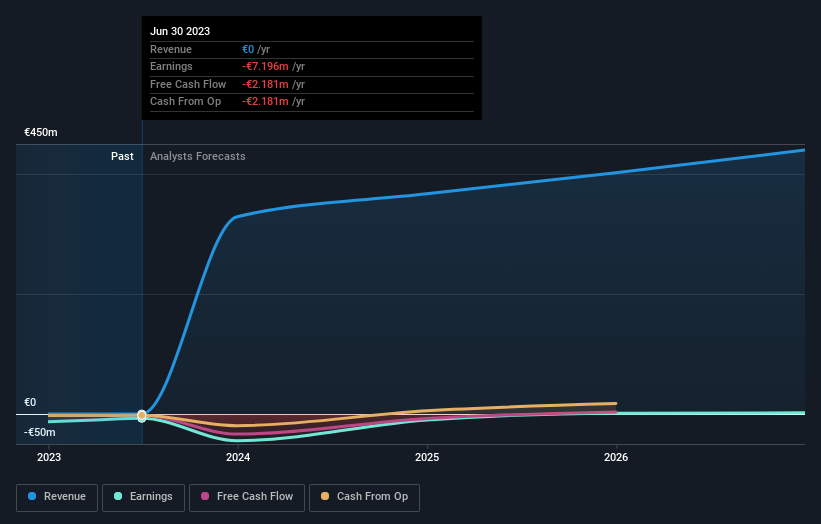- Germany
- /
- Hospitality
- /
- XTRA:MS1
Marley Spoon Group SE's (ETR:MS1) stock price dropped 17% last week; retail investors would not be happy

Key Insights
- Significant control over Marley Spoon Group by retail investors implies that the general public has more power to influence management and governance-related decisions
- A total of 6 investors have a majority stake in the company with 52% ownership
- Insider ownership in Marley Spoon Group is 13%
A look at the shareholders of Marley Spoon Group SE (ETR:MS1) can tell us which group is most powerful. And the group that holds the biggest piece of the pie are retail investors with 43% ownership. In other words, the group stands to gain the most (or lose the most) from their investment into the company.
And last week, retail investors endured the biggest losses as the stock fell by 17%.
Let's take a closer look to see what the different types of shareholders can tell us about Marley Spoon Group.
View our latest analysis for Marley Spoon Group

What Does The Institutional Ownership Tell Us About Marley Spoon Group?
Institutional investors commonly compare their own returns to the returns of a commonly followed index. So they generally do consider buying larger companies that are included in the relevant benchmark index.
Marley Spoon Group already has institutions on the share registry. Indeed, they own a respectable stake in the company. This can indicate that the company has a certain degree of credibility in the investment community. However, it is best to be wary of relying on the supposed validation that comes with institutional investors. They too, get it wrong sometimes. It is not uncommon to see a big share price drop if two large institutional investors try to sell out of a stock at the same time. So it is worth checking the past earnings trajectory of Marley Spoon Group, (below). Of course, keep in mind that there are other factors to consider, too.

Hedge funds don't have many shares in Marley Spoon Group. The company's largest shareholder is 468 Capital, with ownership of 31%. Meanwhile, the second and third largest shareholders, hold 8.0% and 5.1%, of the shares outstanding, respectively.
On further inspection, we found that more than half the company's shares are owned by the top 6 shareholders, suggesting that the interests of the larger shareholders are balanced out to an extent by the smaller ones.
While studying institutional ownership for a company can add value to your research, it is also a good practice to research analyst recommendations to get a deeper understand of a stock's expected performance. There is a little analyst coverage of the stock, but not much. So there is room for it to gain more coverage.
Insider Ownership Of Marley Spoon Group
The definition of company insiders can be subjective and does vary between jurisdictions. Our data reflects individual insiders, capturing board members at the very least. Management ultimately answers to the board. However, it is not uncommon for managers to be executive board members, especially if they are a founder or the CEO.
Insider ownership is positive when it signals leadership are thinking like the true owners of the company. However, high insider ownership can also give immense power to a small group within the company. This can be negative in some circumstances.
It seems insiders own a significant proportion of Marley Spoon Group SE. It has a market capitalization of just €122m, and insiders have €16m worth of shares in their own names. This may suggest that the founders still own a lot of shares. You can click here to see if they have been buying or selling.
General Public Ownership
The general public-- including retail investors -- own 43% stake in the company, and hence can't easily be ignored. While this size of ownership may not be enough to sway a policy decision in their favour, they can still make a collective impact on company policies.
Private Equity Ownership
Private equity firms hold a 31% stake in Marley Spoon Group. This suggests they can be influential in key policy decisions. Some investors might be encouraged by this, since private equity are sometimes able to encourage strategies that help the market see the value in the company. Alternatively, those holders might be exiting the investment after taking it public.
Private Company Ownership
Our data indicates that Private Companies hold 8.0%, of the company's shares. It's hard to draw any conclusions from this fact alone, so its worth looking into who owns those private companies. Sometimes insiders or other related parties have an interest in shares in a public company through a separate private company.
Next Steps:
It's always worth thinking about the different groups who own shares in a company. But to understand Marley Spoon Group better, we need to consider many other factors. Take risks for example - Marley Spoon Group has 5 warning signs (and 3 which are potentially serious) we think you should know about.
But ultimately it is the future, not the past, that will determine how well the owners of this business will do. Therefore we think it advisable to take a look at this free report showing whether analysts are predicting a brighter future.
NB: Figures in this article are calculated using data from the last twelve months, which refer to the 12-month period ending on the last date of the month the financial statement is dated. This may not be consistent with full year annual report figures.
New: Manage All Your Stock Portfolios in One Place
We've created the ultimate portfolio companion for stock investors, and it's free.
• Connect an unlimited number of Portfolios and see your total in one currency
• Be alerted to new Warning Signs or Risks via email or mobile
• Track the Fair Value of your stocks
Have feedback on this article? Concerned about the content? Get in touch with us directly. Alternatively, email editorial-team (at) simplywallst.com.
This article by Simply Wall St is general in nature. We provide commentary based on historical data and analyst forecasts only using an unbiased methodology and our articles are not intended to be financial advice. It does not constitute a recommendation to buy or sell any stock, and does not take account of your objectives, or your financial situation. We aim to bring you long-term focused analysis driven by fundamental data. Note that our analysis may not factor in the latest price-sensitive company announcements or qualitative material. Simply Wall St has no position in any stocks mentioned.
About XTRA:MS1
Marley Spoon Group
Through its subsidiary, Marley Spoon SE, operates as a direct-to-consumer (DTC) meal-kit company.
Medium-low and slightly overvalued.

